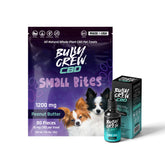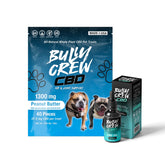Lymphoma is a type of cancer that originates in specific immune system cells called lymphocytes. These specialized cells, which include T-cells and B-cells, play a crucial role in keeping our bodies healthy by fighting off infections and removing harmful substances. Think of them as the immune system's cleanup crew, patrolling through a fluid called lymph to eliminate bacteria and other foreign invaders.
Under normal circumstances, T-cells and B-cells work tirelessly to protect the body. However, when these cells become cancerous, they lose their ability to perform their essential duties. This malfunction leads to a condition known as lymphoma, which can affect T-cells, B-cells, or both.
In this blog, we'll explore the causes, symptoms, and treatment options of lymphoma cancer in dogs, unraveling the complexity of this condition in an easy-to-understand way.
Signs of Lymphoma in Pets
One of the most noticeable lymphoma cancer in dogs symptoms is visual—the lymph nodes become visibly swollen. These enlarged nodes are often discovered accidentally while petting your dog. The most common areas where swollen lymph nodes may be felt include beneath the jaw, behind the knees, and in front of the shoulders. When swollen lymph nodes, they tend to feel firm and can usually be moved slightly back and forth beneath the skin. Interestingly, these swollen lymph nodes are typically not painful to the touch, making it easier to identify them during a routine cuddle or grooming session. Recognizing these signs early can help ensure timely consultation with a veterinarian for proper diagnosis and care.
Related: Medicinal Mushrooms for Cancer in Dogs
Lymphoma cancer in dogs stages
If your dog is diagnosed with lymphoma, your vet might recommend staging tests to determine how far the cancer has spread. The extent of the spread typically indicates how serious the condition is. Staging tests often include blood work, urine analysis, X-rays, ultrasounds, and other diagnostic tools.
Canine lymphoma is categorized into five stages:
-
Stage I: A single lymph node is affected.
-
Stage II: Multiple lymph nodes are enlarged on either the front or back of the body.
-
Stage III: Lymph nodes on both the front and back of the body are affected.
-
Stage IV: The cancer has spread to organs like the liver or spleen.
-
Stage V: The cancer involves the bone marrow or other organs like the gut, skin, or nervous system.
Each stage is further divided into two subcategories:
-
Substage A: Your dog still feels well.
-
Substage B: Your dog is showing signs of illness.
These tests and classifications help your vet create the best treatment plan for your pet's needs.
Canine Lymphoma Test
Lymphoma is a serious health concern for dogs, but the good news is that there's now a test available to help screen for it early. This test involves your veterinarian taking a small sample of your dog's blood, which is then analyzed for specific biomarkers associated with lymphoma. Some veterinarians, however, may skip this blood test and go directly to a procedure called fine needle aspiration (FNA). This method uses a very fine needle to collect a small tissue sample from the affected area, such as a lymph node, for further examination. Both options are minimally invasive and generally well-tolerated by dogs, but fine needle aspiration may provide more accurate results in diagnosing lymphoma. Consulting with your veterinarian can help determine the best approach for your dog's situation.
Lymphoma cancer in dogs causes

The exact cause of lymphoma in dogs remains unknown. Researchers believe that both genetic factors and environmental exposures play a role. Since dogs share our living spaces, they are exposed to various environmental factors that could contribute to cancer development. Studies have also explored other potential causes, such as viruses and bacteria, but no definitive conclusions have been reached.
Standard Lymphoma cancer in dogs treatment
The standard lymphoma in dogs prognosis is chemotherapy, with severe cases sometimes requiring surgery or radiation. A common chemotherapy plan is the CHOP protocol, which includes four drugs—cyclophosphamide, Hydroxydaunorubican, Oncovin, and Prednisone—over a 25-week period. This approach often puts dogs into remission, but it can lower white blood cell counts during treatment. If that happens, the medication is adjusted to ensure the dog's safety and health.
Healthy Diet for Lymphoma
A healthy diet is essential for all dogs, especially those battling cancer. Cancer cells thrive on sugar, which is why diet plays a crucial role in managing the disease. Unfortunately, many kibble diets contain over 50% sugar, which can fuel the spread of cancer.
If you're looking for healthier alternatives, there are several options. You can choose responsibly made pet food from reputable companies (often delivered dehydrated and requiring water), cook meals for your dog based on your vet's or a canine nutritionist's recommendations, or consider a raw food diet. Since every dog's needs are unique, it's essential to consult a professional to determine the best diet based on your dog's health, history, and lifestyle.
CBD For Dogs with Lymphoma
CBD has become a popular choice for pet parents looking to support their lymphoma cancer in dogs. It's often used alongside traditional treatments or as an additional way to help manage symptoms. Many dog owners turn to CBD for its potential to provide natural relief and improve their pet's overall comfort and quality of life.
How CBD May Help Dogs with Lymphoma Cancer in Dogs Symptoms
Lymphoma treatments in dogs often cause side effects like nausea, vomiting, and loss of appetite. CBD can help alleviate these issues by interacting with the endocannabinoid system (ECS), which is key in regulating digestion and appetite. By activating serotonin receptors, CBD can reduce nausea and vomiting, while CBDA—a raw form of CBD—is even more effective in helping dogs feel better and regain their appetite.
While more clinical research is needed, experts agree that targeting the ECS is a promising approach for managing cancer. Combining traditional chemotherapy with ECS-focused treatments could pave the way for advanced cancer care solutions in the future.
CBD for Easing Pain and Reducing Inflammation in Dogs
Many dogs with lymphoma face discomfort from gastrointestinal issues or nerve pain caused by cancerous lesions. CBD can help by interacting with the TRPV1 receptor, which regulates pain, inflammation, and body temperature. Studies suggest CBD's anti-inflammatory properties may ease pain, promote healing, and provide much-needed relief for dogs with cancer.
Additionally, CBD supports immune health. Since excessive inflammation often accompanies canine cancer, CBD's CBD's ability to reduce inflammation can help create a more balanced immune response. By strengthening immune resilience, CBD gives dogs extra support to face health challenges like lymphoma.
CBD for Cancer & Tumors in Dogs
Many dogs with lymphoma face discomfort from gastrointestinal issues or nerve pain caused by cancerous lesions. CBD can help by interacting with the TRPV1 receptor, which plays a role in regulating pain, inflammation, and body temperature. Studies suggest CBD's anti-inflammatory properties may ease pain, promote healing, and provide much-needed relief for dogs with cancer.
Additionally, CBD supports immune health. Since excessive inflammation often accompanies canine cancer, CBD's ability to reduce inflammation can help create a more balanced immune response. By strengthening immune resilience, CBD gives dogs extra support to face health challenges like lymphoma.
Promoting Bone Health and Seizure Control
Certain types of lymphoma can affect your dog's bone health, leading to pain and even fractures. CBD can help support bone strength by blocking the GPR55 receptor, linked to conditions like osteoporosis and bone loss. This may help improve bone density in dogs. Additionally, extranodal lymphoma can sometimes cause seizures, but CBD may help by calming overactive brain activity, potentially reducing both the frequency and severity of seizures.
Conclusion
Facing a lymphoma diagnosis for your dog can be overwhelming. However, many pet owners find their dogs can achieve remission and lead fulfilling lives with appropriate treatment. Lymphoma is among the most treatable cancers in dogs, and with the proper care, lymphoma in dogs survival rate is high.
CBD and Turkey Tail Mushroom have emerged as promising complementary therapies for dogs with lymphoma. It offers multiple health benefits, including alleviating nausea, reducing pain, and supporting immune balance. By addressing these symptoms, CBD and Turkey Tail Mushroom can enhance your dog's comfort, overall well-being and lymphoma cancer in dogs life expectancy. Whether used alongside traditional treatments or as a primary wellness approach, CBD provides a holistic option for pet parents dedicated to their dog's quality of life.
Ultimately, the decision rests with you. So, can lymphoma in dogs be cured? The answer is Yes.
It's essential to explore all available options, consult your veterinary oncologist, and seek a second opinion to determine the best course of action for your dog's treatment. Your commitment to your pet's health and happiness is the most important factor in their journey.
My Dog Marshal's Recovery From Lymphoma: A Story of Hope
Marshal is my dog, my buddy, and my family. Last year, I was hit with devastating news—Marshal was diagnosed with Lymphoma. It started subtly in late February with symptoms that didn't seem serious at first. By April and May, he was being treated for various issues, including gastrointestinal problems, but nothing was conclusive. Then in June, he collapsed by the pool. I rushed him to the ER, and they thought it might be inflammatory bowel disease (IBD). Soon after, he had what appeared to be a mini-stroke. That's when we finally got the diagnosis—Lymphoma.
The doctors gave him three months to live. I can't tell you how gut-wrenching it was to hear that. By August, his condition had deteriorated to the point where euthanasia was being discussed. One morning, as I was preparing to make the toughest decision of my life, Marshal surprised me—he woke up looking better, like his old self. It gave me hope, and I decided to fight for him.
I turned to holistic treatments instead of following the conventional path of chemo. I started giving Marshal high-content CBD oil with elevated levels of THC, Turkey Tail Mushrooms, and alkaline water. The results were nothing short of miraculous. Today, Marshal is still with me, and we're approaching a year since his symptoms first started.
I've learned so much through this journey, and I feel it's my responsibility to share what I've experienced. From my time working with rescues, I've seen chemo do more harm than good in most cases. In my opinion, the ratio is 9:1—nine dogs harmed for every one helped. I'm not saying chemo doesn't work, but I urge anyone facing a similar situation to do their research first. There are holistic approaches worth exploring that focus on improving quality of life.
One of the most surprising discoveries was alkaline water. Research shows that cancer cells struggle to survive in an alkaline environment. Unfortunately, this isn't something you'll hear much about, likely because pharmaceutical companies don't want it widely known. But it's a game-changer, and I strongly recommend looking into it.
Marshal's journey has been one of resilience and hope. If there's one takeaway from our story, it's this: never give up on your pet. Advocate for them, question the standard treatments, and always explore all your options. Marshal's still here with me, and I believe it's because we chose a path that worked for him.







